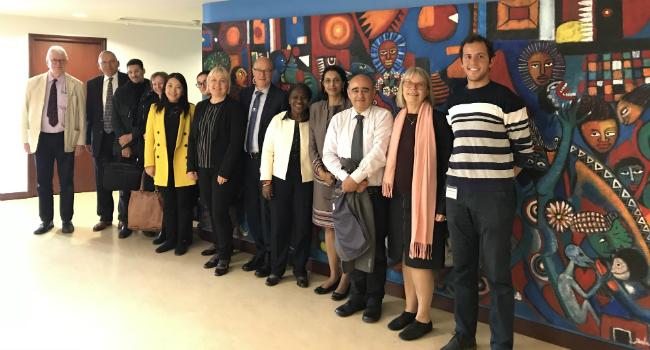The agreement on the UNESCO Centre for Problem Based Learning in Engineering Science and Sustainability at Aalborg University (AAU) has just been extended. Originally signed in 2013, the agreement is now in place until 2025.
The ongoing partnership was marked at a meeting at the UNESCO headquarters in Paris where a number of representatives of the AAU UNESCO Centre and the UNESCO Advisory Body discussed strategies for the coming years.
Competences for solving global problems
Professor Anette Kolmos, who heads the Aalborg centre, was very positive after attending the meeting that also included UNESCO’s Shamila Nair-Bedouelle, Assistant Director-General for Natural Sciences, as well as Peggy Oti-Boateng, Director of Science Policy and Capacity-Building.
‘With the extension of our centre, we will devise a new strategy for what we should focus on in the coming years. We came away with many good ideas on the Sustainable Development Goals from UNESCO, who also requested our help in getting students to work with the SDGs and ensuring that students acquire competences that can help address these global issues,’ says Anette Kolmos.
Problem-based knowledge in engineering
Dean Henrik Pedersen from AAU’s Technical Faculty of IT and Design of which the UNESCO centre is a part also attended the meeting.
He highlights the productive discussions on AAU’s ability to play a role in the 700 biosphere reserves defined by UNESCO and distributed in 120 countries. Biosphere reserves differ from traditional nature conservation areas in that they combine core areas subject to strict eco-restrictions with zones where sustainable business activity takes place.
‘Biosphere reserves are about caring for the environment and fostering a balance between people and the environment; this directly relates to the SDGs. And the message was quite clear: If we are to advance something in the UNESCO context, then there is a need for engineers. Problem-based knowledge in engineering – that’s what UNESCO needs, and that’s what we’re experts in at AAU,’ says Henrik Pedersen.
FACTS
- Anette Kolmos, Professor and Director of the UNESCO Centre, has had a special UNESCO professorship in problem-based learning (PBL) since 2007.
- Since 2009, AAU has had its own centre for problem based learning and sustainability. This centre came under the auspices of UNESCO in 2013.
- The new agreement with UNESCO runs until 2025.
- Learn more about the AAU UNESCO Centre
CONTACT
Anette Kolmos, Professor and Director of the UNESCO Centre for Problem Based Learning and Sustainability, AAU, ak@plan.aau.dk + 45 2020 4208
Henrik Pedersen, Dean, Technical Faculty of IT and Design, AAU, dekan-tech@aau.dk, +45 6011 2787
Nelly Sander, Press Contact, Technical Faculty of IT and Design, AAU, nsa@adm.aau.dk, + 45 2912 2559

